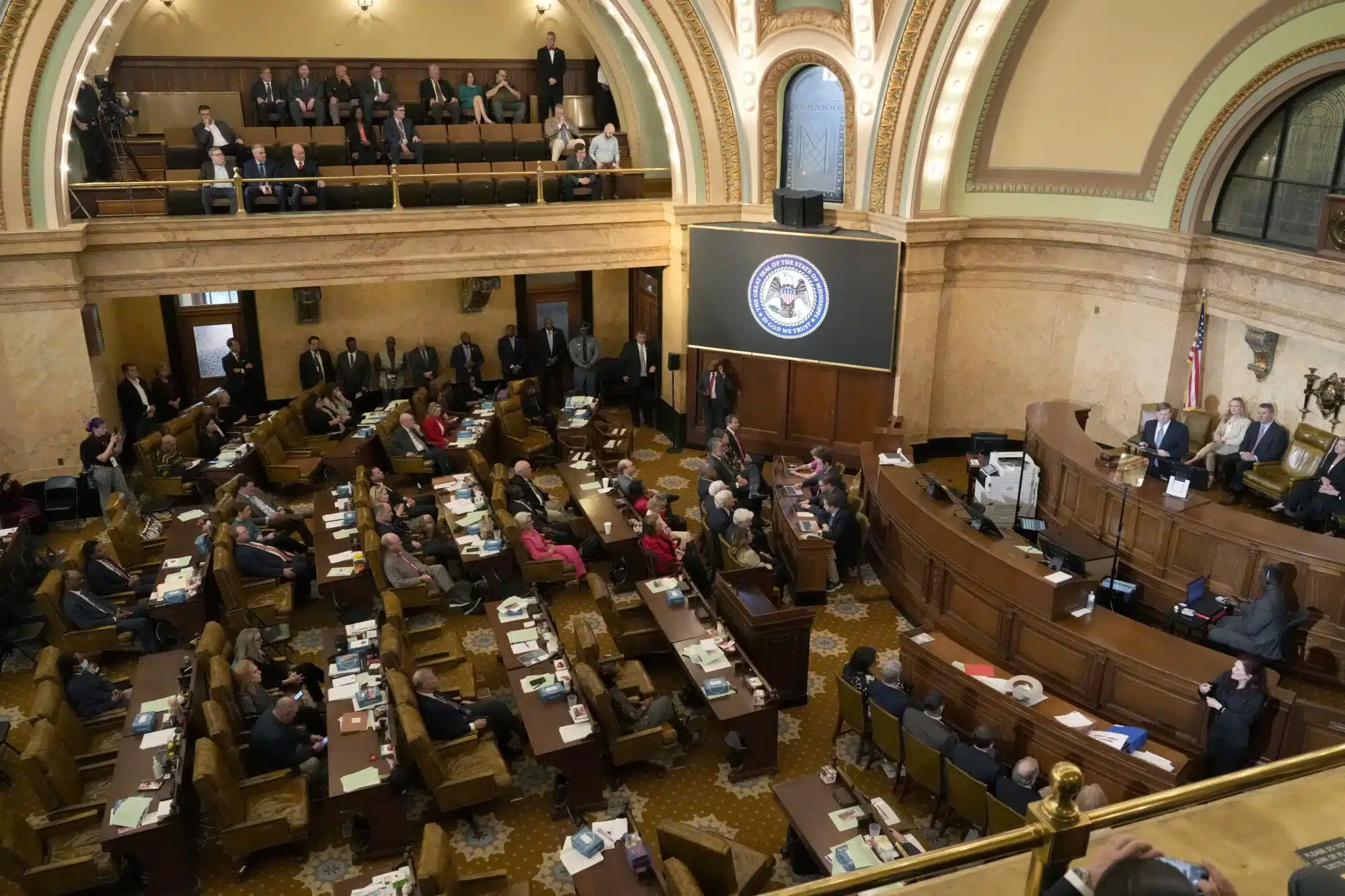This article first appeared on the Magnolia Tribune.

Mississippi House of Representatives chamber, Monday, Feb. 26, 2024, at the state Capitol in Jackson, Miss. (AP Photo/Rogelio V. Solis)
- The legislation prevents the 2% employer rate increase expected in July and replaces it with a 0.5% increase each year through 2028.
In the final days of the 2024 legislative session, the Mississippi House and Senate have both agreed on a bill that would redirect the looming Public Employee Retirement System (PERS) employer rate increase expected in July, and any potential increases after that.
SB 3231 was brought forward through a suspension resolution since the deadline to file new bills has long since passed.
“At the beginning of session, we had a lot of comment on PERS. There was concern by the Board, concern by the Legislature about the solvency of the system going forward,” said State Senator David Parker (R), the bill’s author. “We found a way with a suspension resolution to bring back some of the key elements that I think needed to be addressed.”
The Senate moved quickly on the bill, passing it out of committee and bringing it to the floor for debate on Thursday. The bill, passed the next day by a vote of 34-14 in the Senate, ultimately halts the expected 2% rate increase this summer and replaces it with a 0.5% increase that will be required each year through 2028.
The legislation also changed how future increases would be considered, providing for the input from two additional outside actuaries while making a rate increase dependent on the approval of the Legislature. The structure of the PERS Board as currently comprised is being left as is.
Senator Parker said hearings held by the Senate Government Structure Committee were beneficial to see that the PERS Board members were good representatives of the subsections of beneficiaries that elect them. He also heard from PERS members that they did not want to see a change to the Board.
Lawmakers will also be required to pursue legislation that would add an additional Tier during the 2025 session, a move that is said to only impact new hires coming into the system. All current employees and retirees will see no changes to their benefits with any of these measures.
“One single actuary over the last five years had been providing most of the decision making on both the ARR and the consideration for a change in the employer contribution rate. That actuary had given different advice for five years in a row that ranged from full and great solvency to needs for improvement, to we have a major problem,” said Parker.
There are expectations that the Legislature will also appropriate an additional one-time cash infusion to the system this year. While the amount has not been confirmed, both Senator Parker and State Representative Hank Zuber (R), who presented the bill on the floor of the House on Saturday, said it looks to be somewhere around $100 million.
The legislation was passed in the House by a vote of 107-1. It was briefly held on a motion to reconsider by State Representative Robert Johnson (D), but that motion was tabled on Sunday allowing the bill to move forward.
The PERS Board had first approved a rate increase in the fall of 2023. The increase would begin in July 2024 at 2%, increasing another 2% in July 2025 and 1% in July 2026 until a full 5% increase was reached.
Estimations say that every 2% accounts for roughly $300,000 in one agency or entity’s operating budget.
Since that decision by the Board, lawmakers have shared examples of officials from cities, counties, school districts, and other boards that have expressed concern as to what such an increase would do to their operating budgets. Many have said it could result in layoffs or terminations, a freeze on hiring, discontinuing of programs, or even local tax increases.
Senator Parker said ultimately there needs to be more information and advice to receive an accurate snapshot to where the system stands.
The House originally presented legislation to completely revamp the PERS Board, allowing for the Governor and Lt. Governor to have most of the appointing power for what would become an 11-member structure. It also included the provisions to require legislative approval for any rate increases. That bill died in a Senate committee.
Now, the compromise legislation passed this weekend heads to the Governor for his signature. If it is signed into law, it would go into effect immediately.
This article first appeared on the Magnolia Tribune and is republished here under a Creative Commons license.
Read original article by clicking here.

